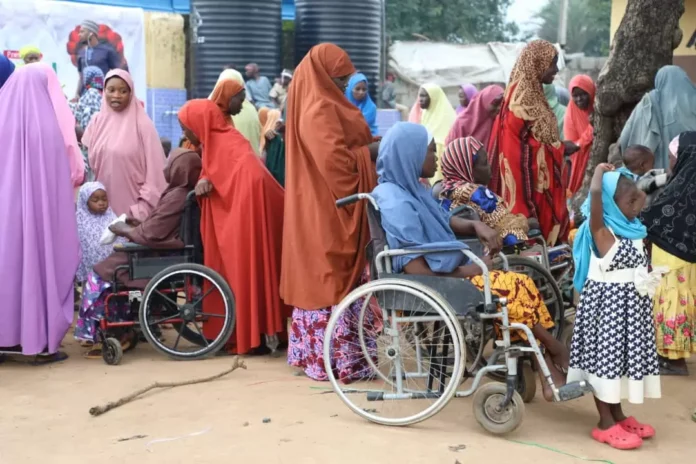In a significant stride towards improving the quality of life for Persons with Disabilities (PWDs) in Nigeria, the North East Development Commission (NEDC) recently distributed 188 assistive devices in Borno State. The distribution event, held in Maiduguri, highlighted the commission’s commitment to empowering PWDs by providing essential tools to enhance mobility and accessibility.
The assistive devices distributed include a range of mobility aids such as crutches, prostheses, wheelchairs, and walking armpits. Specifically, the breakdown of the devices comprises 100 prostheses, 30 wheelchairs, 30 crutches, and 28 walking armpits. These devices were meticulously selected and procured at a cost of N94 million, underscoring the NEDC’s dedication to making a tangible impact in the lives of PWDs in the region.
The beneficiaries of this initiative were carefully chosen from the Maiduguri Metropolitan Council (MMC) and Jere council. The selection process ensured that the devices reached those most in need, enabling them to navigate their environments more independently and with greater ease. The NEDC’s managing director, Mohammed Alkali, emphasized the importance of this initiative, noting that the provision of these assistive devices would significantly aid PWDs in accessing essential services such as markets, schools, and hospitals.
Alkali highlighted that beyond providing mobility aids, the NEDC is committed to supporting the overall well-being of PWDs. In line with this commitment, the commission also provided financial support to the beneficiaries. Over 300 individuals received N50,000 each as transport fare to return to their respective communities, easing the financial burden associated with accessing this vital support.
The distribution event also saw the participation of James Lalu, the executive secretary of the National Commission of Persons with Disabilities (NCPWD). Lalu underscored the magnitude of this initiative, describing it as a milestone in the ongoing efforts to address the needs of PWDs in Nigeria. He highlighted that there are an estimated eight million PWDs in the North-East region alone, a figure that underscores the immense need for such initiatives. Lalu praised the NEDC for its proactive approach and expressed hope that this event would set a precedent for similar actions across the country.
The distribution of assistive devices by the NEDC is part of a broader strategy to promote inclusivity and accessibility for PWDs. The commission has been actively involved in various projects aimed at improving the socio-economic conditions in the North-East, a region that has faced significant challenges due to conflict and underdevelopment. By focusing on PWDs, the NEDC is not only addressing immediate needs but is also fostering a more inclusive society where all individuals, regardless of their physical abilities, have the opportunity to thrive.
This initiative also highlights the importance of collaboration between various governmental bodies and agencies. The NEDC’s partnership with the NCPWD is a prime example of how coordinated efforts can lead to substantial improvements in the lives of vulnerable populations. The success of this event demonstrates the potential of such collaborations in achieving sustainable development goals and enhancing the quality of life for all citizens.
As the NEDC continues its work in the North-East, the recent distribution of assistive devices serves as a beacon of hope and progress for PWDs in the region. It is a reminder that with the right support and resources, individuals with disabilities can overcome barriers and lead fulfilling lives. The commission’s efforts are a testament to the power of inclusive policies and the impact they can have on creating a more equitable society.
In conclusion, the NEDC’s distribution of assistive devices in Borno State is a commendable initiative that provides essential support to PWDs, enabling them to navigate their communities with greater ease and independence. The event marks a significant step towards addressing the needs of PWDs in the North-East and sets a positive example for future efforts to promote inclusivity and accessibility in Nigeria.


